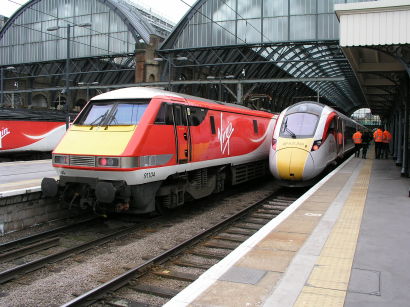THE Commons Transport Committee has called for ‘fundamental reform’ of the railways as it publishes its report into the failure of the Virgin Trains East Coast franchise.
It finds that the franchise was ’operationally profitable’, but that the revenue projections were over-optimistic, while the Department for Transport failed to identify the ‘weaknesses underpinning the bid’.
It concludes the Department must share responsibility, and criticises Virgin founder Sir Richard Branson for his ‘cynical attempt to divert attention’ by blaming Network Rail for failing to achieve various upgrades which would have allowed an improved timetable.
However, the Committee supports the DfT’s decision not to renegotiate the contract with Stagecoach and Virgin, although it was evident from the launch day that revenues were insufficient to cover the premiums, because a rethink would have ‘set a precedent for other operators in similar financial positions’. Transport secretary Chris Grayling, giving evidence, told the Committee that ‘it undermines the credibility of the system if you simply let somebody get away with a failure of this kind’.
It was the third early termination of an Intercity East Coast franchise in little more than a decade. Both GNER and National Express failed to stay the course in 2006 and 2009 because revenue had not been up to expectations. The franchise was then run on behalf of the Department for Transport until March 2015. It reverted to state control in June this year, and is to be replaced by a new form of Partnership franchise in due course.
Network Rail’s role had been discussed at length, and Richard Branson had blamed Network Rail failings for VTEC’s problems – at least in part. In January this year he said the bid was ‘based on a number of key assumptions’ which did not prove accurate. He further claimed that ‘poor track reliability’ cost VTEC ‘hundreds of millions of pounds and torpedoed the assumptions of our original bid’.
The Committee concludes that this was not only a ‘cynical attempt to divert attention’, but that it also caused confusion over what infrastructure upgrades were supposed to be achieved. It does not find that Network Rail was even partly responsible for the collapse of the franchise.
The Committeeˆs chair Lilian Greenwood said: ‘Franchises should be able to withstand normal fluctuations in the economic cycle. Naivety, over-optimistic expectations and a mismanaged bid process all played a role in the failure of this franchise—the third in little over a decade.
‘The secretary of state pointed the finger at Stagecoach and Virgin for getting their bids wrong, but the Department is not blameless. Even now, there is no concrete plan, nor timescales, for the interim operator of this franchise. From our inquiry, we cannot be sure, and cannot reassure passengers or public, that the arrangements for the East Coast Partnership will more successfully overcome the systemic difficulties presented by the current set-up.
‘Following the failure of the East Coast line, there is talk that the Prime Minister has ordered a major review of rail franchising—we await more details. However, if this or any other future Partnership arrangement is truly going to deliver a step-change in performance for the passenger, more fundamental reform of our railways is required.’
Transport Focus chief executive Anthony Smith said: ‘However the East Coast is run, passengers will be looking for the quality of current services to be maintained and built on.
‘Passengers will continue to judge services by performance, whether it is punctuality, value for money, the cleanliness of the train or levels of crowding. Having more stability in the underlying contract between Government and the train company will help achieve these things.’


